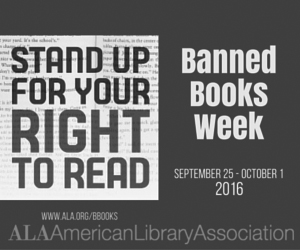Editorial
The importance of exercising our First Amendment rights
September 28, 2016
A problem in today’s society is that people are often too afraid to speak their minds. People are more worried about offending others than they are about making their voices heard, and the result is too much self-censorship.
Why is this a bad thing? One could argue that this has caused many people not to express themselves, and in many cases, people are unable to provide constructive criticism to their peers. This could be detrimental in both the workplace and the classroom because if we do not provide our peers with feedback, and we ourselves do not receive any, then how can we expect to get better at anything? The truth is that one really cannot improve if one does not see things from the perspectives of others.

Banned Books Week was observed this past week at St. A’s.
Some people, however, have had the courage to voice their opinions. An example here at St. A’s of students standing up for their beliefs is a small group of players on the football team who have followed in the footsteps of NFL quarterback Colin Kaepernick’s national anthem protest. They protest against police brutality against African-Americans, and although some argue that it is disrespectful, and others argue that it is necessary to face the issue, the fact remains that the First Amendment guarantees them the right to protest.
Oftentimes, censorship can also deteriorate the quality of the education we receive. This week serves as a perfect example of that. It happens to be “Banned Books Week” nationwide. Right here at Saint Anselm, members of the college community are observing this by taking part in a number of events hosted by the Geisel Library.
One of the events took place on Sept. 27, from 9am to 4pm, when Saint Anselm students, faculty and staff took part in a “Banned Book Read-Out” on the Alumni Quad. Some of the books that members of the St. A’s community read aloud that day were classics like Harper Lee’s To Kill a Mockingbird, F. Scott Fitzgerald’s The Great Gatsby, J.D. Salinger’s The Catcher in the Rye, James Joyce’s Ulysses, and the Bible.
Many of these works, among others on the banned books list, are viewed by many as inspirational and important pieces of literature. A lot of the banned titles also have important life lessons embedded within them. Unfortunately, censorship in the United States, and elsewhere over the years, has prohibited students from learning about them in school.

Ray Bradbury’s Fahrenheit, one of the many books featured at the “Banned Book Read-Out” on Sept. 27.
Now, in some cases, is restraint justified? Of course it is. Just because the First Amendment acknowledges Americans can say or express something, that does not always mean that they should. As newspaper editors, this is a line that we walk every time we send an issue off to print. We must consider how a particular quote or line within an article will affect the image of this newspaper as well as Saint Anselm College as a whole. However, as journalists there are certain things that we have an obligation to investigate and report to those who read this publication, so it is important that we exercise good judgment. We try to get it right all the time, and when we don’t, we correct it.
The same is true of people in everyday life. We sometimes find ourselves in situations when we must confront someone and speak our mind, while other times it isn’t a bad idea to allow our internal filter to kick in so that we don’t say something damaging we’ll later regret.
It is important for us to strike a balance when it comes to censorship, and to remember that finding yourself on either extreme end of the spectrum could end up backfiring in the long run. However, we must also be careful to recognize that we must not be so timid as to never let our voices be heard.


